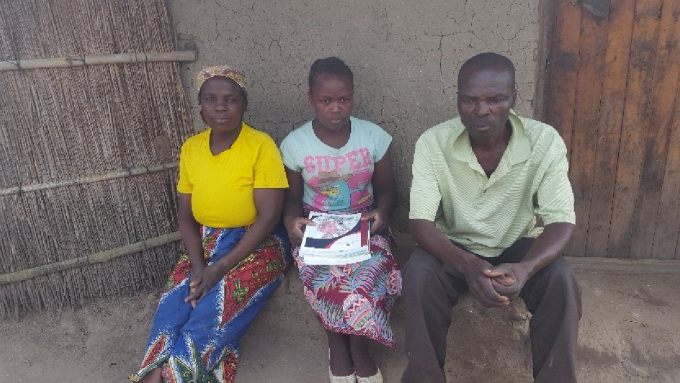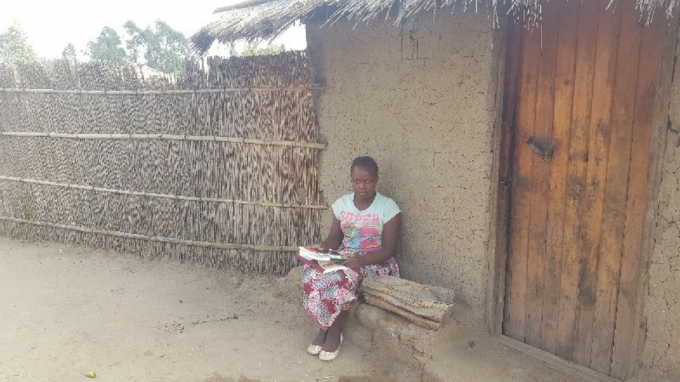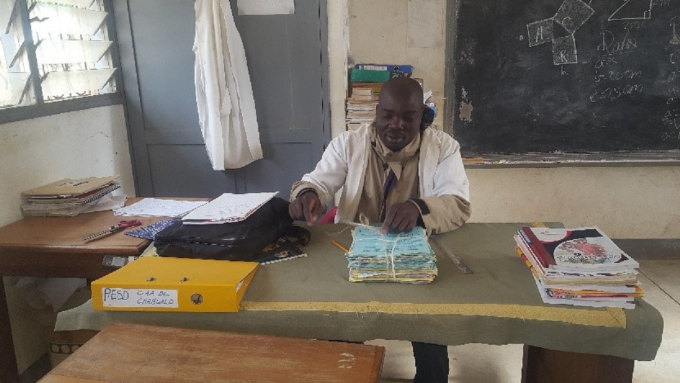Star-G project: a chance for girls to advance in education
Constância Armando Gervásio is a girl aged 16 years and daughter to Gervásio Armando and Maria Katunga. She hails from Chabualo community in the district of Angonia, Tete province and has been attending the Chabualo Distance Learning Center since February 2019. The community is 32 km from the Administrative Post of Úlonguè, in the district of Angónia.
In this area, early pregnancies and marriages for young girls are recurrent due to the poverty levels within this community. Most of the girls drop out of primary school mid-way with a majority who complete primary not getting to secondary school. Constância has not been an exception to these challenges. Coming from a poor household, she was not able to join secondary school immediately due to lack of resources to support her enrollment.
Having completed grade 7 in 2017, she had to stay at home for a whole year in 2018. She, however, was thirst to continue with her education and on this regard, she requested her parents’ to ask the chief of Chabualo Primary School to allow her attend grade 7 classes rather than stay home. Her request was granted.
“I finished 7th grade in 2017 and in 2018 I couldn't attend the 8th grade because my parents couldn't afford my enrolment in a secondary school, but as I wanted to continue studying, I preferred to ask my parents to request the school manager to go back to school as an assistant throughout 2018. I felt that if I stayed at home, I would lose the momentum of going back to school and risk getting married’’, she noted.
However, Save the Children in partnership with the Institute of Open and Distance Education (IEDA), through the STAR-G II Project, supported in the set-up of the distance-learning center, bringing secondary education closer to the community and in a much easier way that children could get an opportunity to learn. The Distance Learning approach is a programme of secondary education offered by the Ministry of Education and Human Development through the IEDA, as part of efforts to expand access to secondary education. To promote girl’s education, Save the Children is a pioneer organization in the introduction of the long-distance learning approach. Students access the tutorial from the DL centers and are able to undertake self-learning at home but can access tutors for clarification on points they would have questions.
Constância was able to enroll in the DL center in her community where she is able to access learning materials and tutorials to advance her secondary education. She was however quick to note, “even though this option provided secondary school education close to my community, my parents are still having trouble paying tuition (approximately 8 USD/year) and I'm afraid that when they start charging I'll be prevented from coming to study”. Constância is in the early stages of the program and hopes to improve her grades and be able to transition across the grades similarly and complete secondary school.
Her father eagerly noted, “I am very happy that my daughter finally managed to enroll for 8th grade after spending a whole year as an assistant in 7th grade. In this era, education is the basis of her future and because we have the center based in our community then it is much easier for her. My only struggle is to get money to pay my daughter's tuition, because I wish she could finish her secondary education and advance her education further”.
The DL center manager, Mr. Zacarias Ruben (he also benefited for child safeguarding training from Save the Children), a teacher at Chabualo Primary School, had interesting remarks on the student indicating the enthusiasm and commitment of the girls in accessing education. “Constância has been my student since grade 6; she is always on time and hardworking. Having failed to enroll for grade 8 in 2018, she became an assistant for grade 7 which she had already completed. Now she has found this great opportunity to attend secondary school, yet she continues to face financial difficulties, as her caregivers are unable to pay her DL center fees even with the easier payment options’’.
The introduction of DL centers has created opportunities for more girls like Constância to access secondary education. The project is also working to continue sensitizing parents and guardians about girls right to access education as well as boys.
Save the Children International and its implementing partners (HOPEM, CESC and Progresso), in collaboration with the Ministry of Education and Human Development, Pedagogical University (UP) and IEDA, is implementing the STAR-G project - Successful Transition and Advancement of Rights for Girls Education, under the Girls Education Challenge (GEC) by DFID. The overall vision is to improve the quality of life of the deprived girls by ensuring increased access to education, the quality and relevance of teaching in schools, as well as offer new learning opportunities designed to improve outcomes for a successful transition through the implementation of different approaches.
STARG revolves around 5 outputs; educational pathways (DL and CBE), TPD and learning resources for girls, school governance and child protection, community mobilization and girls’ empowerment. The project is implemented in 3 provinces in Mozambique, namely Gaza, Manica and Tete, supporting 75 DL Centers.
A number of studies have shown that interventions which reduce the distance from home to school are effective in increasing access to education for young people who live in remote rural locations. However, it’s not always possible to build new schools in remote locations, and even when this is possible, it can be very difficult to recruit qualified teachers to work in them.
Distance learning programmes can play a crucial role in supporting young people who are deprived as a result of their remote rural location to access education.
Girls in Mozambique have limited transition opportunities to secondary education. Based on a Save the Children study (2017), only a few girls (3% in poor settings families) who pass the grade 7 national exams can transition to lower secondary grade 8. However, due to limited spaces, each year, schools offer a limited quota of students to access grade 8. Consequently, not every child who completes grade 7 is able to transition due to an acute shortage of secondary schools in rural remote areas. As a result, most girls fail to transition. The few girls who do transition gradually drop out due to the vast distances, secondary school expenses as well as appalling conditions in privately rented accommodation that double up as students boarding houses where girls live unsupervised and exposed to all forms of abuse. As such many parents opt out of sending their girls to secondary schools far away from their communities, decision also influenced by their gender biases.
 Mozambique
Mozambique